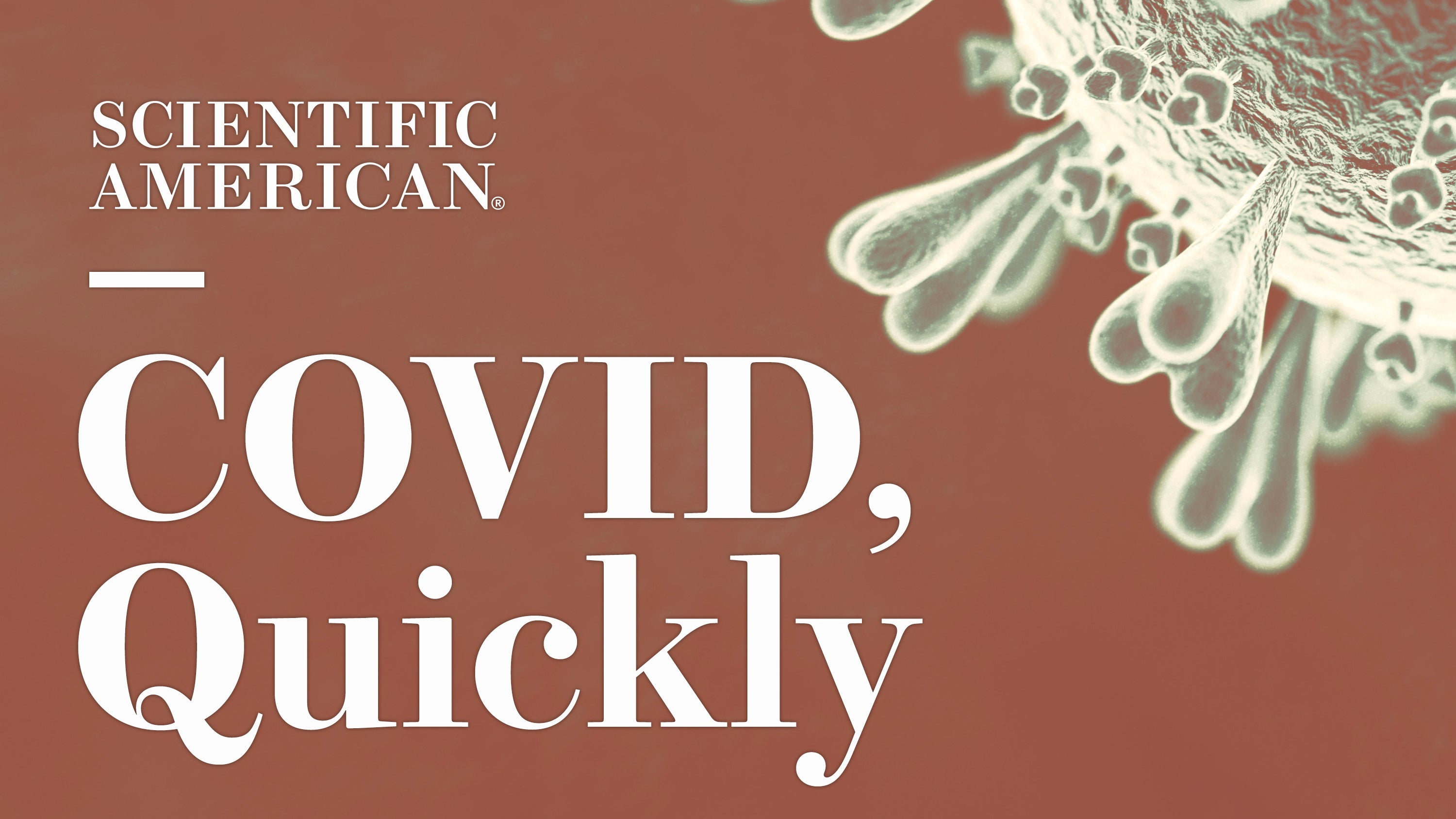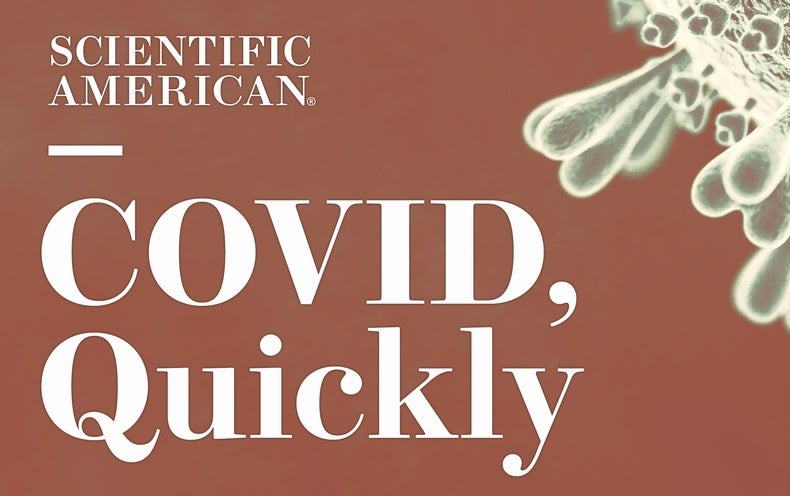
Tanya Lewis: Hello, and welcome to COVID, Rapidly, a Scientific American podcast sequence!
Josh Fischman: That is your fast-track replace on the COVID pandemic. We convey you on top of things on the science behind probably the most pressing questions in regards to the virus and the illness. We demystify the analysis, and enable you perceive what it actually means.
Lewis: I’m Tanya Lewis.
Fischman: I’m Josh Fischman.
Lewis: And we’re Scientific American’s senior well being editors.
That is our back-to-school particular episode, half two. We’ll speak about why so few younger kids have gotten their COVID vaccines…
Fischman: …and the way lengthy we should always actually be isolating after we get sick.
—
Fischman: Many children are again in—or heading again to—faculty and preschool now, and we all know meaning the chance of spreading COVID will improve. But only a few younger kids have gotten the vaccine.
Lewis: That’s proper. COVID vaccines have been obtainable for all ages since mid-June. However solely a couple of third of kids ages 5 by way of 11 are absolutely vaccinated. And amongst children below 5, the numbers are even decrease: only a couple p.c.
Fischman: That’s actually low. Why is it so low?
Lewis: Nicely, there are many causes. The Kaiser Household Basis polled dad and mom of younger kids about why they selected to not vaccinate their little one towards COVID. The highest motive dad and mom cited was that the vaccines had been too new and had not been examined sufficient. Others had been frightened about their little one having negative effects that will imply having to remain house and take care of them. However a substantial group of oldsters—about 1 in 10—mentioned they merely weren’t that frightened about COVID anymore, so that they didn’t suppose their child wanted a vaccine.
Fischman: Inform me extra about that—why weren’t they frightened about COVID?
Lewis: Nicely, since fairly early within the pandemic, the messaging from some specialists and media was that youngsters don’t get as sick from COVID, particularly in the event that they didn’t have any underlying well being situations. And that’s true to some extent. However we additionally know that greater than 1,400 kids within the U.S. have died from the illness—together with greater than 500 below the age of 5.
Fischman: Others have been hospitalized with a situation known as MIS-C, which impacts many various organs, and a few children have developed lengthy COVID. Whereas these issues are uncommon, being vaccinated might assist shield children towards them.
Lewis: Precisely. However the message that COVID isn’t a priority for teenagers has been fairly entrenched, and lots of dad and mom have merely stopped following the information about it. They understandably simply need to get again to regular: going again to highschool, having playdates, and so forth. And getting vaccinated simply hasn’t appeared as necessary to many dad and mom, lots of whose children have already had COVID and had been okay.
Fischman: In different phrases, dad and mom had been extra frightened in regards to the vaccine than about COVID itself.
Lewis: That’s proper. I talked to a few dad and mom of younger kids about how they approached the choice of whether or not or to not vaccinate their little one. Michelle Fox, the mom of a two-year-old boy in Massachusetts, advised me that her son had COVID in Might, proper earlier than the vaccines grew to become obtainable to his age group. She and her husband haven’t had him vaccinated but, partially as a result of he had COVID just lately and doubtless had some immunity from that. However she additionally mentioned her husband was considerably involved in regards to the threat of some extraordinarily uncommon aspect impact, partially as a result of her son was born untimely and he or she herself suffered an especially uncommon aspect impact throughout being pregnant.
Fischman: That’s actually attention-grabbing. Very uncommon negative effects from vaccination do happen, although vaccines are typically extraordinarily protected. However COVID itself can carry a threat for teenagers—I imply, 1,400 deaths. And a few children do get extreme illness.
Lewis: They do. On the finish of the day, each guardian has to resolve for themself the best way to decide what they suppose is an even bigger threat to their little one. Vaccination is one device—a really efficient one—to decrease the small threat of extreme sickness in children, particularly as we head into one other fall and winter with this virus.
And up to date booster photographs that concentrate on Omicron particularly have now been licensed by the FDA. They’re just for adults and children 12 and over, so youthful children must wait just a little longer for the brand new ones.
—
Lewis: 5 days of isolation. That’s how lengthy you’re supposed to maintain to your self for those who get COVID. However there’s some new proof that 5 days won’t be fairly lengthy sufficient.
Fischman: Eight days could be extra prefer it, Tanya. That’s how lengthy you could be infectious, on common, based on some latest analysis.
However let’s again up a bit. The explanation for isolation is to maintain from spreading the illness to different individuals, to cease them from getting sick. In August, the CDC mentioned to isolate for 5 days from the beginning of signs.
Lewis: After that, for those who haven’t had a fever for a day and different signs have improved, you’ll be able to exit, proper? However for those who do, you continue to should put on a very good masks for one other 5 days.
Fischman: That’s the official line, sure.
Lewis: However I’m guessing you’re about to inform us that’s not the scientific line.
Fischman: You bought it. Consultants had been by no means proud of that 5-day window, saying there’s a very good probability that you may nonetheless unfold the virus after that time. As an example, there was a research within the New England Journal of Drugs exhibiting that individuals contaminated with the Omicron variant shed infectious virus 8 days after their first signs.
A research simply revealed in The Lancet Respiratory Drugs regarded on the viral a great deal of individuals contaminated with the alpha and delta variants. Researchers estimated that about two-thirds of them would nonetheless be infectious to their communities at 5 days. That threat lasted so long as 7 days. And there’s different work pointing in the identical course.
Lewis: So that actually spotlights the significance of the second a part of that CDC steering: put on a very good, tight-fitting masks for an additional 5 days. N95s, KF94s, masks like these.
Fischman: Yep, and that’s in all probability why the CDC put the masks half in there. The 5-day window was at all times sort of mushy, and truthfully the 8-day window is a bit mushy too. Might be a bit extra, might be a bit much less. That Lancet research discovered that viral shedding was decrease in direction of the top of that interval, indicating the chance of spreading was petering out.
And one different factor that Lancet analysis confirmed: speedy antigen assessments did a very good job of exhibiting individuals after they stopped being infectious.
Lewis: However testing to depart isolation isn’t a part of the CDC steering.
Fischman: No, it is not. Regardless that the company that approves these assessments, the FDA, says that two assessments are fairly correct for those who take them 48 hours aside. They’re good at recognizing the virus, and actually good at letting you realize when it is gone.
Look, isolation is difficult, and I feel the CDC didn’t need to make assessments a barrier to getting out of your home. And masks do work. You possibly can put on one whereas going to an area library, a neighborhood heart, or a drug retailer to choose up some antigen assessments. Use them. And that means you’ll maintain everybody round you protected.
—
Lewis: Now you’re on top of things. Thanks for becoming a member of us. Our present is edited by Jeff Delviscio and Tulika Bose.
Fischman: Come again in two weeks for the following episode of COVID, Rapidly. And take a look at sciam.com for up to date and in-depth COVID information.
[The above text is a transcript of this podcast.]

